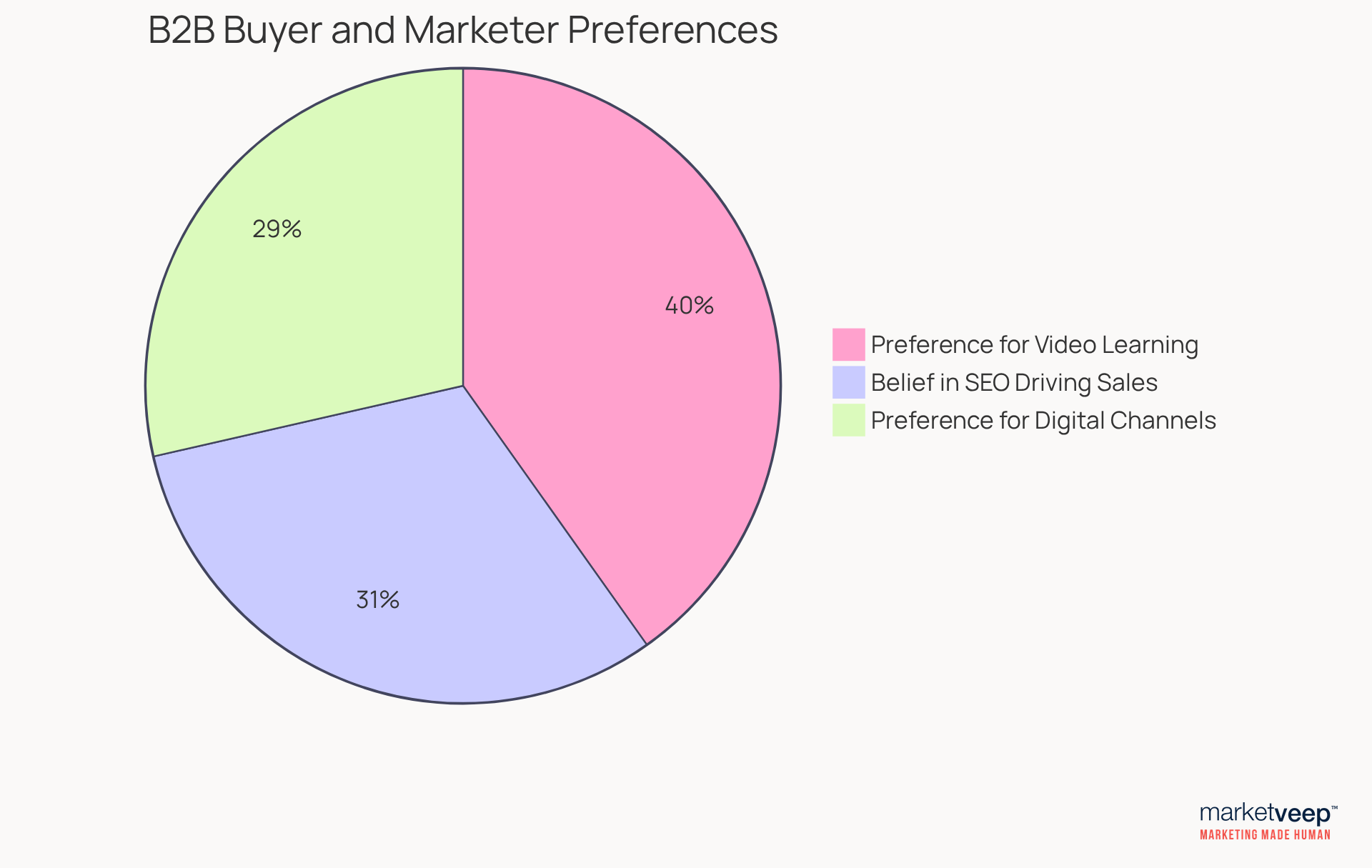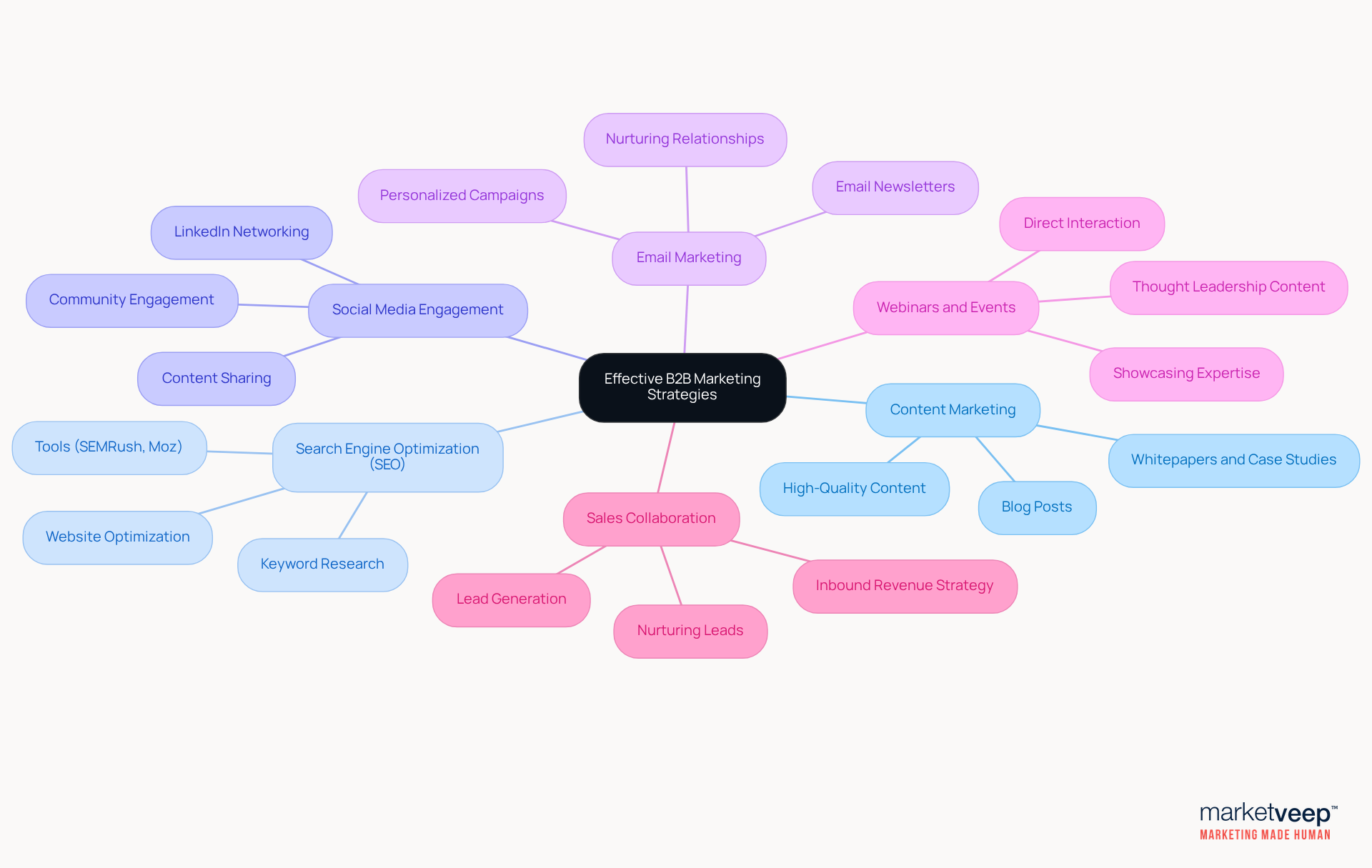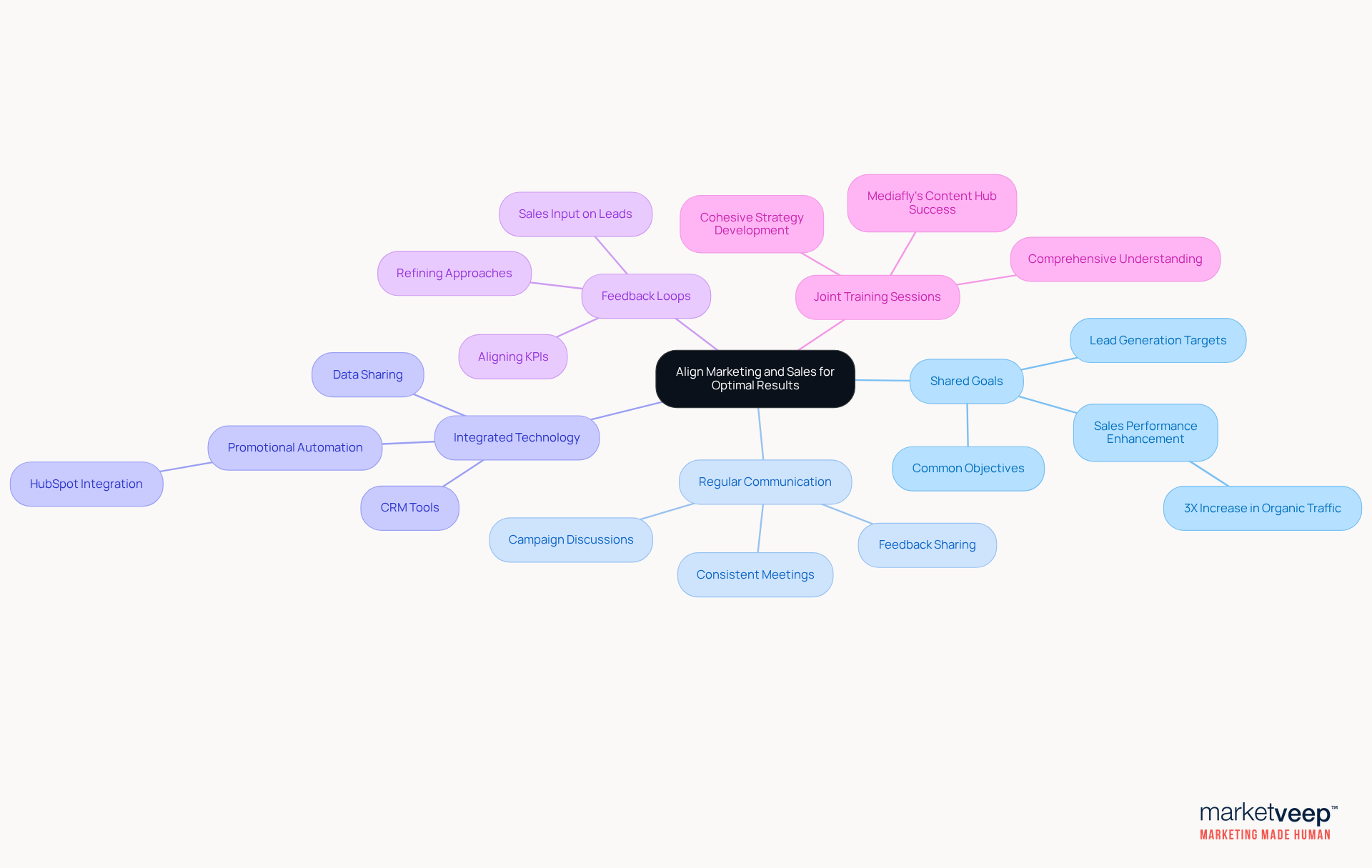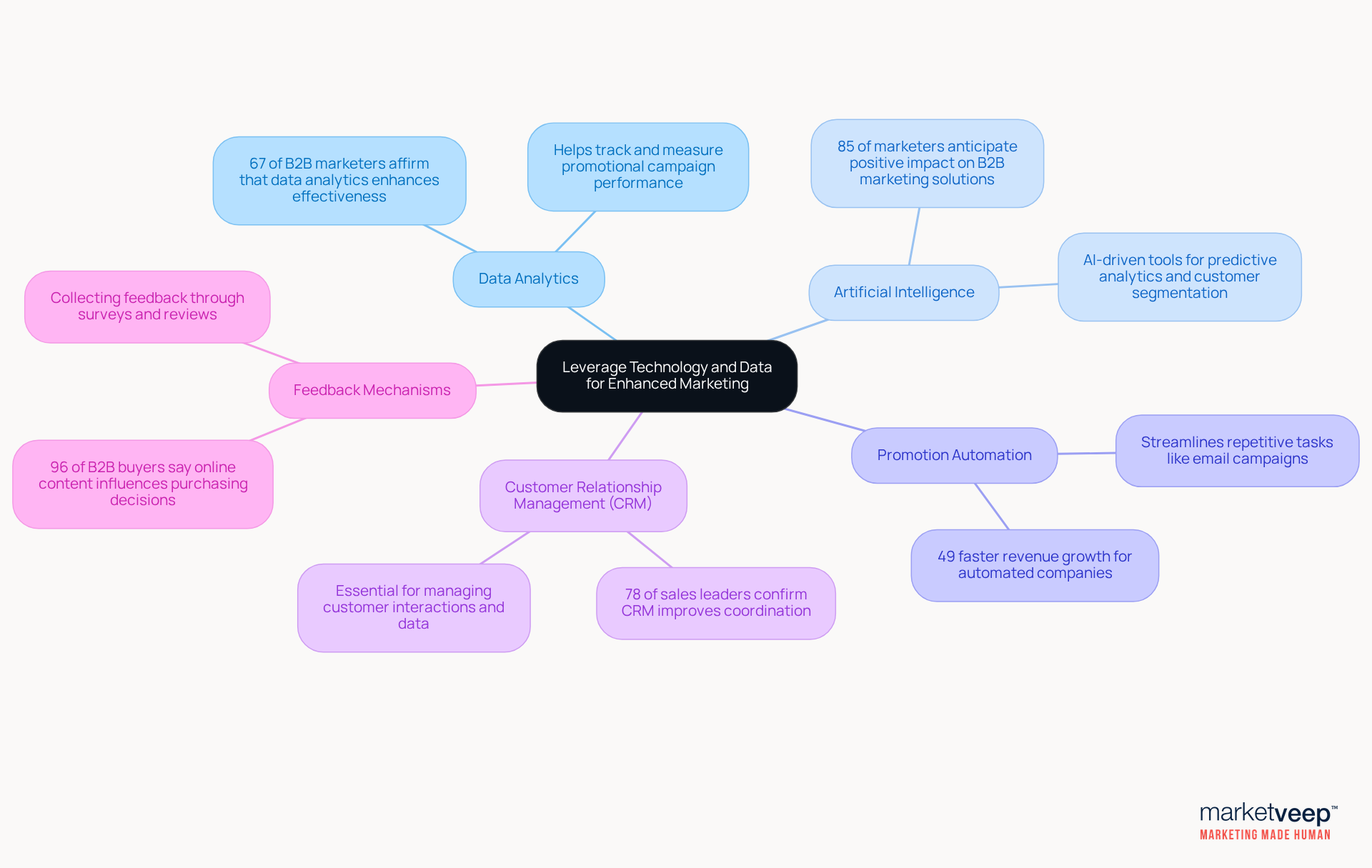Overview
B2B marketing solutions for manufacturing executives are crucial for effectively connecting with other businesses and driving revenue growth through tailored strategies. The significance of digital channels, SEO, and content marketing cannot be overstated. Recent statistics underscore the evolving preferences of B2B buyers, illustrating how these solutions can markedly enhance a manufacturing company's market position. By embracing these strategies, executives can not only meet but exceed the expectations of their clientele, positioning themselves as leaders in the industry. It is imperative for manufacturing companies to adapt and thrive in this dynamic landscape.
Introduction
In the intricate world of manufacturing, where products are often complex and tailored to specific client needs, the significance of B2B marketing cannot be overstated. As digital channels rise in prominence, manufacturers are presented with a unique opportunity to refine their marketing strategies, enhance their online presence, and ultimately drive revenue growth. However, with an overwhelming amount of information available, how can manufacturing executives effectively navigate this evolving landscape to ensure their marketing efforts resonate with modern B2B buyers?
Define B2B Marketing and Its Importance
B2B promotion, or business-to-business promotion, encompasses the strategies and tactics employed by companies to sell products or services to other businesses rather than individual consumers. This approach is crucial in the manufacturing sector due to the intricate nature of products and the specialized requirements of clients.
Successful B2B marketing solutions enable manufacturers to clearly articulate their value propositions, fostering connections with key decision-makers and ultimately driving revenue growth. As the manufacturing landscape evolves, it is essential to note that:
- 64% of new-age B2B buyers prefer digital channels.
- 70% of B2B marketers believe SEO drives more sales than PPC, underscoring the necessity of a robust online presence.
- 90% of B2B buyers prefer video to learn about products or services.
Therefore, understanding the nuances of B2B marketing is vital for executives seeking to enhance their company's market position and achieve sustainable growth.
By leveraging these strategies, alongside insights from our case studies that demonstrate proven ROI, manufacturers can adeptly navigate the competitive landscape and meet the expectations of contemporary buyers. At Market Veep, we offer dedicated support channels and collaboration tools that empower our clients to monitor their unique business objectives and progress in real-time.

Implement Effective B2B Marketing Strategies
To implement effective B2B marketing strategies, manufacturing executives must concentrate on several key areas:
- Content Marketing: Develop high-quality content that addresses the specific pain points of your target audience. This includes whitepapers, case studies, and blog posts that not only showcase your expertise but also provide solutions to common industry challenges. Consistently providing valuable content can greatly improve lead generation and cultivate prospects throughout the B2B transaction process with B2B marketing solutions.
- Search Engine Optimization (SEO): Optimize your website and content for search engines to boost visibility and attract organic traffic. Employ relevant keywords that resonate with your audience's search behavior. Effective SEO approaches, such as utilizing tools like SEMRush and Moz, can help identify high-impact keywords and enhance your site's ranking, ultimately attracting qualified leads.
- Social Media Engagement: Leverage platforms like LinkedIn to connect with industry professionals and foster community engagement. Share insights, participate in discussions, and promote your content to build brand awareness and establish authority in your sector. With 85% of finding LinkedIn to deliver the best value, it’s crucial to maintain an active presence.
- Email Marketing: Create focused email campaigns that direct prospects through the purchase pipeline. Personalization is key; tailor your messages based on the recipient's interests and behaviors to enhance engagement. Research indicates that 71% of B2B marketers utilize email newsletters, making this a vital channel for nurturing relationships.
- Webinars and Events: Organize webinars or engage in industry events to showcase your products and expertise. This approach not only builds credibility but also facilitates direct interaction with potential clients. As 94% of marketers believe that extensive thought leadership content enhances brand perception, these platforms can significantly contribute to establishing your company as a trusted resource in the industry.
- Sales Collaboration: Collaborate with your team to generate, nurture, and close leads effectively. Implementing an inbound revenue strategy, along with automation and reporting, can streamline your processes and enhance customer experiences. By concentrating on these aspects, manufacturing leaders can enhance their promotional efforts using b2b marketing solutions and achieve considerable revenue growth.

Align Marketing and Sales for Optimal Results
To achieve optimal outcomes, manufacturing leaders must ensure alignment between their marketing and revenue teams. This alignment is crucial for driving performance and can be accomplished through several best practices:
- Shared Goals: Establishing common objectives is essential. Both teams should work towards lead generation targets or revenue goals, fostering teamwork and accountability. This collaboration significantly enhances sales performance. For instance, Market Veep has shown that effective alignment can lead to a 3X increase in organic traffic for manufacturing clients.
- Regular Communication: Consistent meetings are vital for discussing ongoing campaigns, sharing feedback, and adjusting strategies as necessary. This practice keeps both teams informed and engaged, promoting a collaborative environment.
- Integrated Technology: Utilizing CRM and promotional automation tools, such as HubSpot, facilitates seamless data sharing between teams. Market Veep focuses on enhancing these systems, ensuring that they have access to the same information regarding leads and clients. This integration streamlines processes and boosts efficiency. Additionally, incorporating services like SEO, content promotion, and social media outreach can further improve alignment and effectiveness.
- Feedback Loops: Establishing a system for the sales team to provide input on lead quality and promotional effectiveness is crucial. This feedback assists in refining approaches and better meeting the sales group's requirements, ultimately leading to enhanced outcomes. Aligning KPIs between revenue generation and promotion is essential for accountability and can greatly improve performance.
- Joint Training Sessions: Conducting training sessions that involve both teams ensures a comprehensive understanding of products, target audiences, and messaging. This approach builds a cohesive strategy for customer engagement. For example, Mediafly's success in creating a consolidated content hub illustrates how joint training can lead to improved alignment and performance in B2B manufacturing. By leveraging Market Veep's extensive promotional services, including analytics and real-time reporting, manufacturing executives can develop data-driven strategies that align their sales and promotional efforts with effective B2B marketing solutions.

Leverage Technology and Data for Enhanced Marketing
To elevate B2B marketing efforts, manufacturing executives must strategically leverage technology and data in several impactful ways:
- Data Analytics: By employing analytics tools, organizations can meticulously track and measure the performance of their promotional campaigns. The insights garnered from this data reveal critical customer behavior patterns, enabling more focused and efficient promotional strategies. Notably, 67% of B2B marketers affirm that data analytics significantly enhances the effectiveness of their B2B marketing solutions, underscoring the necessity of this approach.
- Artificial Intelligence: The implementation of AI-driven tools for predictive analytics and customer segmentation is vital. These advanced technologies can pinpoint potential leads and tailor communication messages to specific audiences, thereby enhancing engagement. Indeed, 85% of marketers anticipate that AI will positively impact B2B marketing solutions in the upcoming year, marking it as an essential component of modern strategies.
- Promotion Automation: Utilizing promotion automation platforms streamlines repetitive tasks, such as email campaigns and social media postings. This not only boosts efficiency but also liberates teams to concentrate on strategic and creative initiatives. Companies that embrace automation in their B2B marketing solutions report a remarkable 49% faster revenue growth compared to their non-automated counterparts.
- Customer Relationship Management (CRM): Investing in a robust CRM system is crucial for managing customer interactions and data throughout the customer lifecycle. A well-integrated CRM guarantees that all teams have access to current information, enhancing collaboration and customer service. Significantly, 78% of sales leaders confirm that their B2B marketing solutions, including CRM, improve coordination between sales and promotional teams.
- Feedback Mechanisms: Establishing systems for collecting customer feedback through surveys and reviews is essential. This information can steer product development and promotional strategies, ensuring alignment with customer needs. With 96% of B2B buyers indicating that online content significantly influences their purchasing decisions, leveraging these insights is paramount for effective B2B marketing solutions.

Conclusion
B2B marketing stands as a pivotal strategy for manufacturing executives intent on forging connections with other businesses, amplifying their market presence, and driving sustainable growth. By grasping the distinct needs of B2B buyers and harnessing effective marketing solutions, manufacturers can clearly articulate their value propositions and cultivate meaningful relationships with key decision-makers. This approach is increasingly essential as the manufacturing landscape transitions towards digital channels and data-driven strategies.
The article delineates several critical strategies for successful B2B marketing, encompassing:
- Content marketing
- SEO
- Social media engagement
- Email marketing
- The imperative of aligning marketing and sales teams
Each of these components plays a vital role in generating leads, nurturing client relationships, and ultimately achieving revenue objectives. Furthermore, the integration of technology and data analytics is underscored as a means to optimize marketing efforts and enhance customer engagement.
In conclusion, the importance of adopting robust B2B marketing solutions cannot be overstated. As the manufacturing sector continues to evolve, embracing these best practices will not only improve operational efficiency but also cultivate long-term relationships with clients. Executives are urged to prioritize these strategies and remain adaptable to the shifting market dynamics, ensuring their organizations thrive in an increasingly competitive environment.
Frequently Asked Questions
B2B marketing, or business-to-business marketing, refers to the strategies and tactics used by companies to sell products or services to other businesses rather than individual consumers.
B2B marketing is crucial, especially in the manufacturing sector, as it helps companies articulate their value propositions, connect with key decision-makers, and drive revenue growth.
Key trends include that 64% of new-age B2B buyers prefer digital channels, 70% of B2B marketers believe SEO drives more sales than PPC, and 90% of B2B buyers prefer video for learning about products or services.
Manufacturers can enhance their B2B marketing strategies by understanding the nuances of B2B solutions, leveraging case studies that demonstrate proven ROI, and utilizing dedicated support channels and collaboration tools to monitor business objectives and progress.
A robust online presence is essential in B2B marketing, as it significantly impacts sales, with many marketers believing that SEO is more effective than PPC for driving sales.











